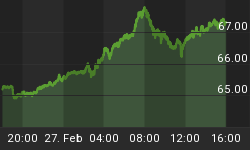To their credit, Wall Street pundits have noted the proliferation of signs warning financial danger; to their peril most have chosen to ignore them. Four examples of such cognitive dissidence relate to General Motors, gold, pensions, and the housing bubble.
Shares of General Motors, once the world's largest company, the icon of America's industrial might, at one time close to being declared a monopoly by a 1950's Congressional investigation, this week plunged to a new 80 year low. Years ago, my prediction that the company would ultimately face bankruptcy seemed radical. Today that assertion no longer seems so far-fetched. The truth is that GM sold too many gas guzzling SUV's to too many people without making any profits, saturating its market and piling up debt and pension liabilities in the process. The fact that Wall Street can shrug-off the possibility of a General Motors bankruptcy is mind-boggling. It is not as if automobiles are buggy whips. How can the demise of this industry, once the envy of the world and the driving force behind Roosevelt's "arsenal of democracy," be dismissed so easily? Could a warning bell possibly sound any louder?
When it comes to gold, Wall Street continues tuning out the inflation warning, its current strength is so clearly sounding. All too common is the routine way in which stock investors cavalierly take comfort from the bond market. Since long-term yields are still low they conclude inflation must not be a threat. Gold's warning must therefore be false, or its rise in price reflective of factors other than inflation. This equates to stock investors not worrying about inflation merely because bond investors have made the same mistake.
But by far the most comical example I have witnessed thus far was an exchange on CNBC's "Kudlow & Company," where Larry Kudlow asked his guest if she was worried that rising gold prices might signify higher inflation. She replied that she was not worried at all. In her opinion, it made perfect sense that some of the dollars created to fund our trade deficit would go into gold. Not only did such a ridiculous answer reveal that she knew nothing about inflation, but Mr. Kudlow's response revealed that he knew even less. Besides agreeing with his guest, he added that while rising gold prices in the 1970's were problematic as they reflected higher inflation, today they were actually a positive sign, as they reflected strong economic growth! No wonder they call him Lawrence of America.
This week's New York City transit strike underscored another of the biggest time bombs in the U.S. economy, pension liabilities. Though many private sector employees are already dealing with the grim realities of under-funded pensions, public sector workers are just beginning to face the unpleasant reality. For decades, it was easy for politicians to appease unions without angering current voters by committing to highly generous, but completely unfunded pension benefits. Now that these contingent liabilities are coming due, workers in both sectors are in for rather rude awakenings. With personal savings at an all-time low, rising interest rates, and falling real incomes, retirement in America will soon be as passé as the single income household.
When it comes to the housing bubble, signs of a top (specifically the for-sale variety) are literally all around us. Yet Wall Street's judgment remains clouded by meaningless new construction numbers and phantom new home sales. They have yet to realize that publicly traded homebuilders are now in the business of selling shares, not houses, and that maintaining a market for the former requires that they keep building the latter, regardless of whether or not a market will actually exist for those houses by the time they are completed. Such a concern is irrelevant for those insiders currently selling shares. It will only become a problem for those foolish enough to buy. Further, many new home sales in effect do not represent sales at all, but rather option issuances. Receiving a $25,000 deposit on a $500,000 condo hardly constitutes a sale. If real estate prices fall, or "buyers" simply fail to qualify for financing due to higher interest rates, changing financial circumstances, or the inability to sell other properties, such options will not be exercised, leaving homebuilders holding a glut of unsold inventory.
Finally, in a Bernard Baruch classic, the personal ad of a twenty-three year old female Russian immigrant, featured on a popular internet dating site, ending with the following post script: "man who is in real-estate, real-estate developers or investors are welcome because i am interested to get into this and learn how to make right investments."
Don't be fooled by the rhetoric. Pull Wall Street's wool out of your eyes and protect what's left of your wealth. Download my free research report, "The Collapsing Dollar: The powerful Case for Investing in Foreign Equities" at www.researchreport1.com , and subscribe to my free online newsletter at http://www.europac.net/newsletter/newsletter.asp and get my latest recommendations for global diversification.















